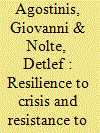| Srl | Item |
| 1 |
ID:
180345


|
|
|
|
|
| Summary/Abstract |
What explains the variation in how states collectively deal with public health challenges across different regions? We tackle this puzzle by comparing the regional health governance efforts pursued within the Central American Integration System (SICA) and the Union of South American Nations (UNASUR). We show that Central America's health governance has been driven by external actors, whereas South America's was driven by states within the region, and remained insulated from external actors’ influence. We argue that the explanation for such variation lies in the interplay of state capacity and regional leadership. In Central America, weak state capacity combined with the absence of a regional leader willing to provide governance resources. This opened up space for external actors to contribute actively to regional health governance, complementing the governance of Central American governments. In South America, Brazil's regional leadership mobilised neighbouring states’ capacities by promoting a South-South cooperation agenda based on intra-regional exchanges among national health bureaucracies, which, however, proved vulnerable to intergovernmental conflicts. Through the comparison of Central and South America, the article bridges the gap between global health governance scholarship and comparative regionalism, providing new insights on the determinants and effects of regional health governance modes in the Global South.
|
|
|
|
|
|
|
|
|
|
|
|
|
|
|
|
| 2 |
ID:
189987


|
|
|
|
|
| Summary/Abstract |
Latin American regionalism displays a long history of crises, which have affected almost all regional organisations (ROs) across different waves of regionalism. The article conducts the first comparative analysis of the outcomes of crises in Latin American ROs across time, tackling the following questions: What have been the outcomes of the crises faced by Latin American ROs? Under what conditions does a crisis result in the survival or breakdown of the affected RO in Latin America? We adopt a multi-method approach that combines QCA with process tracing to identify the causal pathways to the survival or breakdown of ROs across a universe of eight crises. The findings show that Latin American ROs have been resilient to crises, which resulted in RO survival in seven cases out of eight. The QCA reveals how the distributive nature of interstate conflicts and the availability of majority voting are both sufficient conditions for Latin American ROs to survive a crisis. Analysis of the outlier case of UNASUR shows that normative conflicts that take place in the absence of majority voting constitute a ‘perfect storm’ configuration that can lead to RO breakdown. The findings also show that Latin America ROs’ tendency to survive crises is associated with the preservation of the status quo in terms of institutional design, which in some cases is achieved through the temporary flexibilisation of existing rules. Differently from the case of the EU, then, the crises of Latin American ROs have not led to the deepening of regional integration, but rather to institutional inertia.
|
|
|
|
|
|
|
|
|
|
|
|
|
|
|
|